Joint Helicopter Command
The Joint Helicopter Command (JHC) is a tri-service organisation uniting battlefield military helicopters of the British Armed Forces for command and coordination purposes.
| Joint Helicopter Command | |
|---|---|
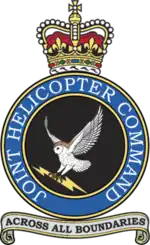 Joint Helicopter Command badge | |
| Active | 5 October 1999 – present |
| Country | |
| Branch | |
| Type | Tri-service command |
| Role | Battlefield helicopter operations |
| Size |
|
| Part of | Army Headquarters[1] |
| Headquarters | Marlborough Lines, Andover |
| Motto(s) | Across all boundaries |
| Aircraft | |
| Commanders | |
| Current commander | Air Vice-Marshal Alastair Smith |
| Inaugural commander | Air-Vice Marshal David Niven |
History
Background
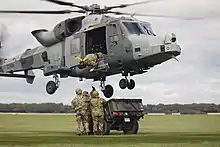
Over the years, the grouping of all battlefield support helicopters operated by the Fleet Air Arm, Army Air Corps and Royal Air Force into one of the services had been discussed, however the Ministry of Defence (MOD) believed that any advantages would be outweighed by the damaging impact such a re-organisation would have on ethos, morale and operational effectiveness.[2]
The Strategic Defence Review (SDR), published by the MOD in July 1998, announced that a Joint Helicopter Command (JHC) would be formed, which would deliver training, standards, doctrinal development and support for operations in order to maximise the availability of battlefield helicopters and reinforce their growing importance in military operations. JHC would be a tri-Service organisation, with personnel remaining part of their parent service.[3] The formation of JHC was considered by the MOD as one of the most important initiatives to result from the SDR.[4] The command was expected to draw on the equipment, personnel and expertise of the single services and be charged with providing the Joint Force Commander tailored packages of battlefield helicopters (from one or more service), support equipment and personnel, to meet operational requirements. The MOD's intention was to provide a single focus for the transfer of best practice from service to service and for removing, over time, differences in extant operating procedures.[2]
A Joint Helicopter Command Study Team was established to determine how JHC should operate. Four options for the location of JHC Headquarters were also examined, with RNAS Yeovilton in Somerset, AAC Netheravon in Wiltshire, HQ Land Command at Erskine Barracks in Wiltshire and RAF Benson in Oxfordshire, being considered for the role.[3]
Establishment
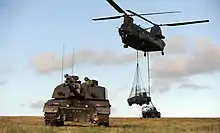
Joint Helicopter Command was formed on 5 October 1999, bringing together the Navy's commando helicopters, the Army's attack and light utility helicopters, and the RAF's support helicopters.[5] The Royal Navy's anti-surface warfare, anti-submarine warfare and airborne early warning helicopters, and RN and RAF search and rescue helicopters, were not included in JHC and remained under the control of the respective services.[3] JHC Headquarters was established alongside HQ Land Command at Erskine Barracks, with Air-Vice Marshal David Niven being the inaugural commander.[6][7]
In 2007, JHC had over 15,000 personnel under its command, some 8,000 of who were part of 16 Air Assault Brigade This included over 900 volunteer reserves from the Territorial Army and Royal Auxiliary Air Force, and 380 MOD civilians.[8]
Joint Helicopter Command's largest operation to date has been Operation Telic, the invasion of Iraq. Following the invasion, Joint Helicopter Command maintained units in Iraq, in support of British and coalition forces deployed there.[9] Another detachment was also maintained in Afghanistan, as part of Operation Herrick.[10]
Role and operations
The majority of the United Kingdom's military helicopters come under JHC, although exceptions include the Royal Navy's anti-surface warfare, anti-submarine warfare and airborne early warning helicopters and the Defence Helicopter Flying School.
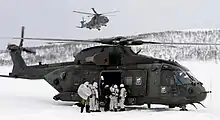
Command
Air-Vice Marshal Alastair Smith became commander of Joint Helicopter Command in March 2023. JHC is part of Army Headquarters and has its headquarters at the British Army's Marlborough Lines, Andover in Hampshire.[11]
Joint Helicopter Force (US)
Since 2009, the US Navy station Naval Air Facility El Centro (NAFEC) in California has been home to Joint Helicopter Force (US), an element of JHC which provides pre-deployment and desert environmental qualification training. The deserts of Southern California have temperatures and terrain closely resembling those of Afghanistan, Iraq and Libya, where British helicopters have been on operational duty in recent years.[12]
Joint Helicopter Force (Northern Ireland)
The JHC operation in Northern Ireland in support of the Police Service of Northern Ireland and military units as part of Operation Banner and later Operation Helvetic was named the Joint Helicopter Force Northern Ireland (JHF(NI)). JHF(NI) consisted of the following units based at JHC Flying Station Aldergrove:[13]
- 5 Regiment[14][15]
- No. 655 Squadron – Westland Lynx AH1
- No. 665 Squadron – Gazelle AH1
- Reconnaissance, Intelligence and Geographic Centre (Northern Ireland)
- No. 230 Squadron – Westland Puma HC1
Joint Helicopter Force (Iraq)
The JHC operation in Iraq as part of Operation Telic was named Joint Helicopter Force Iraq (JHF(I)).[16]
The following aircraft types served with JHF(I):
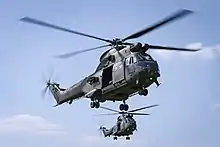
- Boeing Chinook HC2s.[17]
- Westland Sea King HC4s.[17]
- Westland Lynx AH7[17]/AH9s.[18]
- Westland Gazelle AH1s.[17]
- Westland Puma HC1s.[19]
- Westland Merlin HC3s.[20]
Joint Helicopter Force (Afghanistan)
The JHC operation in Afghanistan as part of Operation Herrick was named Joint Helicopter Force Afghanistan (JHF(A))[21] "Task Force Jaguar".[22]
The following aircraft types served with JHF(A):
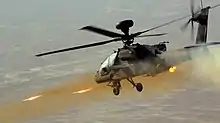
- AgustaWestland Apache AH1s.[23]
- Boeing Chinook[24] HC2s.
- Westland Lynx AH7,[23] AH9 & AH9As.
- Westland Merlin[24] HC3s.
- Westland Puma HC1s.
- Westland Sea King HC4+ from November 2007[23] & ASaC7s
Organisation
An overview of formations from each service under Joint Helicopter Command.[25][26][27][28][29][30]
Senior Commanders
JHC is commanded by a two-star officer from either the Royal Navy, British Army or Royal Air Force.[35]
Commander Joint Helicopter Command has been held by:
- 1999 – 2002 Air Vice-Marshal David Niven
- 2002 – 2005 Air Vice-Marshal Paul Luker
- 2005 – 2008 Major General Gary Coward
- 2008 – 2011 Rear Admiral Tony Johnstone-Burt
- 2011 – 2014 Air Vice-Marshal Carl Dixon
- 2014 – 2017 Major General Richard Felton
- 2017 – 2020 Rear Admiral Jonathan Pentreath
- 2020 – 2023 Air Vice-Marshal Nigel Colman[36]
- 2023 – Present Air Vice-Marshal Alastair Smith
See also
References
Citations
- "How Defence Works Version 6.0" (PDF). assets.publishing.service.gov.uk. UK Ministry of Defence. 1 September 2020. Retrieved 30 November 2020.
Subordinate to CGS are two 3-star commanders and one 2-star commander...Commander Joint Helicopter Command
- Ministry of Defence 1998, p. 200.
- Ministry of Defence 1998, p. 281.
- Ministry of Defence 1998, p. 282.
- "RN/RAF support helicopter programmes merge". Flight Global. Reed Business Information Limited. 13 October 1999. Retrieved 21 April 2019.
- "Joint Helicopter Command Headquarters". Ministry of Defence. Archived from the original on 5 March 2007. Retrieved 21 April 2019.
- "British Military Aviation in 1999". RAF Museum. Retrieved 21 April 2019.
- "Joint Helicopter Command (JHC)". Ministry of Defence. Archived from the original on 5 March 2007. Retrieved 21 April 2019.
- Ripley, Tim (2004). Air War Iraq. Pen & Sword. ISBN 978-1844150694.
- "Rare insight into the Royal Navy's Commando Helicopter Force". 21 February 2016.
- "A New Commanding Officer at the helm". Royal Navy. Retrieved 30 December 2017.
- Copalman, Joe (April 2017). "Desert Dust-Ups". Air Forces Monthly. 349: 41.
- "Operation BANNER – Joint Helicopter Force Northern Ireland (JHF(NI))". Ministry of Defence. Archived from the original on 17 August 2006.
- "Joint Helicopter Command". www.army.mod.uk. Retrieved 21 May 2020.
- "Army Air Corps". www.army.mod.uk. Retrieved 21 May 2020.
- "Operation TELIC – Joint Helicopter Force Iraq (JHF(I))". Minister of Defence. Archived from the original on 17 August 2006.
- "Operation Telic 2" (PDF). Operation Telic. Archived from the original (PDF) on 3 March 2016. Retrieved 21 October 2014.
- "Operation Telic 9" (PDF). Operation Telic. Archived from the original (PDF) on 24 September 2015. Retrieved 21 October 2014.
- "Operation Telic 3" (PDF). Operation Telic. Archived from the original (PDF) on 24 September 2015. Retrieved 21 October 2014.
- "Operation Telic 6" (PDF). Operation Telic. Archived from the original (PDF) on 24 September 2015. Retrieved 21 October 2014.
- "Joint Helicopter Force Afghanistan (JHF(A))". Ministry of Defence. Archived from the original on 11 April 2007.
- "WAR STORY: STUDIES OF CAMP BASTION AND MAIN OPERATING BASE LASHKAR GAH DURING OPERATION HERRICK XVI, AUGUST 2012". IWM. Retrieved 14 August 2021.
- March 2008, p. 8.
- "Operation HERRICK, Afghanistan". Royal Air Force. Archived from the original on 26 June 2017. Retrieved 21 October 2014.
- Heyman, Charles (2013). The Armed Forces of the United Kingdom 2014–2015. Barnsley: Pen & Sword Books Ltd. pp. 179–180. ISBN 978-178346351-0.
- "Commando Helicopter Force". Royal Navy. Retrieved 21 April 2019.
- "Formations, Divisions and Brigades – Joint Helicopter Command". British Army. Retrieved 21 April 2019.
- "JHC FS Aldergrove". Royal Air Force. Retrieved 21 April 2019.
- "RAF Benson". Royal Air Force. Retrieved 21 April 2019.
- "RAF Odiham". Royal Air Force. Retrieved 21 April 2019.
- "The Eagle Spring 2020 edition" (PDF). The Eagle. Wattisham. 1 April 2020. Retrieved 2 May 2020.
- Ripley, Tim (6 April 2020). "UK forms aviation brigade". IHS Janes. Retrieved 2 May 2020.
- "Army establishes its 1st Aviation Brigade". British Army. 5 May 2020. Retrieved 6 May 2020.
- "22 Squadron Re-Forms At RAF Benson". Royal Air Force. 14 May 2020. Retrieved 15 May 2020.
- "Senior tri-service and Ministry of Defence Posts" (PDF). Archived from the original (PDF) on 17 November 2015. Retrieved 1 April 2017.
- "No. 64188". The London Gazette (Supplement). 3 October 2023. p. 19709.
Bibliography
- March, P (2008). The Royal Air Force Yearbook 2008. Fairford, UK: The Royal Air Force Charitable Trust Enterprises.
 This article incorporates text published under the British Open Government Licence v3.0: Ministry of Defence (July 1998). Strategic Defence Review (PDF) (Report). London: Stationery Office. OCLC 606985144. Archived from the original (PDF) on 18 October 2012. Retrieved 21 April 2019.
This article incorporates text published under the British Open Government Licence v3.0: Ministry of Defence (July 1998). Strategic Defence Review (PDF) (Report). London: Stationery Office. OCLC 606985144. Archived from the original (PDF) on 18 October 2012. Retrieved 21 April 2019.